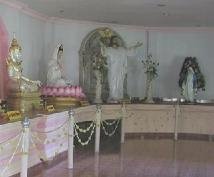By Nicholas Paphitis, Associated Press Writer
(Reprinted from Derveni Papyrus)
ATHENS, Greece - A collection of charred scraps kept in a Greek museum's storerooms are all that remains of what archaeologists say is Europe's oldest surviving book — which may hold a key to understanding early monotheistic beliefs.
More than four decades after the Derveni papyrus was found in a 2,400-year-old nobleman's grave in northern Greece, researchers said Thursday they are close to uncovering new text — through high-tech digital analysis — from the blackened fragments left after the manuscript was burnt on its owner's funeral pyre.
Large sections of the mid-4th century B.C. book — a philosophical treatise on ancient religion — were read years ago, but never officially published.
Now, archaeologist Polyxeni Veleni believes
"I believe some 10-20 percent of new text will be added, which however will be of crucial importance," said Veleni, director of the
"This will fill in many gaps, we will get a better understanding of the sequence and the existing text will become more complete," Veleni told The Associated Press.
The scroll, originally several yards of papyrus rolled around two wooden runners, was found half burnt in 1962. It dates to around 340 B.C., during the reign of Philip II of Macedon, father of Alexander the Great.
"It is the oldest surviving book, if you can use that word for a scroll, in western tradition," Veleni said. "This was a unique find, of exceptional importance."
Greek philosophy expert Apostolos Pierris said the text may be a century older.
"It was probably written by somebody from the circle of the philosopher Anaxagoras, in the second half of the 5th century B.C.," he said.
Anaxagoras, who lived in ancient
Last month, experts from
"We were now able to read even the most carbonized sections, as there were pieces that were completely blackened and nobody could make out whether there were letters on them," Veleni said.
The scroll contains a philosophical treatise on a lost poem describing the birth of the gods and other beliefs focusing on Orpheus, the mythical musician who visited the underworld to reclaim his dead love and enjoyed a strong cult following in the ancient world.
The Orpheus cult raised the notion of a single creator god — as opposed to the multitude of deities the ancient Greeks believed in — and influenced later monotheistic faiths.
"In a way, it was a precursor of Christianity," Pierris said. "Orphism believed that man's salvation depended on his knowledge of the truth."
Veleni said the manuscript "will help show the influence of Orphism on later monotheistic religions."
The Derveni grave, about five miles northwest of
"It belonged to a very rich man, a Macedonian nobleman, warrior and athlete who had a lot of very important and valuable artifacts in his grave," Veleni said. Finds included metal vases, a gold wreath and weapons.
___
Associated Press Writer Costas Kantouris in





No comments:
Post a Comment